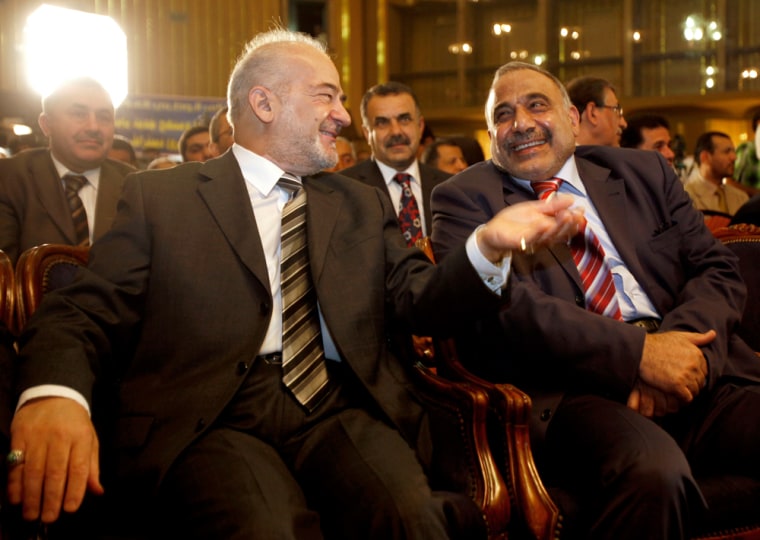Major Iranian-backed Shiite groups announced a new alliance Monday but excluded the Iraqi prime minister in a rare display of disunity among the country's majority Islamic sect. The move puts pressure on Nouri al-Maliki to strike a deal with Sunni parties if he hopes to keep his job after January's parliamentary elections.
The announcement came as bombs on two buses exploded, killing at least 11 in southern Iraq. The blasts were just the latest bombings in recent weeks that have raised fears insurgents are trying to stoke sectarian violence that nearly tore the country apart two years ago.
The party realignment is a major shift in the Iraqi political scene, breaking up a Shiite coalition that has dominated Iraq's government since the fall of Saddam Hussein in 2003.
The new bloc, called the Iraqi National Alliance, will include the largest Shiite party, the Supreme Iraqi Islamic Council, or SIIC, and anti-U.S. cleric Muqtada al-Sadr's bloc, which both have close ties to Tehran, as well as some small Sunni and secular parties.
Tehran could gain deeper influence
If the alliance does well in the Jan. 16 vote, Tehran could gain deeper influence in Iraq just as U.S. forces begin to withdraw. The last American soldier is scheduled to leave Iraq by the end of 2011.
It's also likely to worry Sunnis who largely consider the Supreme Council as little more than an instrument of Iranian policy — exacerbating sectarian divisions at a time when violence that had waned is again on the rise.
Left outside of the alliance, al-Maliki appears to be trying to cast himself as a Shiite leader who can draw in minority Sunnis and Kurds.
Al-Maliki's aides have said the prime minister is working to form a broad-based, national coalition in a bid to end sectarian politics.
Al-Maliki's Dawa Party did not join the new alliance because its leaders would not guarantee that he would remain prime minister if the bloc dominated the election, Shiite lawmaker Reda Jawad Taqi told The Associated Press.
One of al-Maliki's advisers, Hassan al-Sineid, said the prime minister and the leaders of the new alliance differed over "the mechanism of participation in the alliance and the need to open this alliance to include a broad range of political powers."
The realignment does not immediately threaten al-Maliki's position as prime minister, but points to stormy politics in the election campaign and beyond, as U.S. troops prepare to withdraw.
Another setback for al-Maliki
The split between the rival Shiite camps is another setback for al-Maliki's election hopes after his effort to portray himself as a champion of security was battered by a series of devastating bombings in Baghdad, including attacks that struck the foreign and finance ministries, and in northern Iraq in recent weeks.
The latest violence struck Monday when bombs attached to two buses exploded minutes apart in the primarily Shiite southern city of Kut, 100 miles (160 kilometers) southeast of Baghdad, said Iraqi police Brig. Gen. Raed Shakir Jawdatan.
The first blast occurred at about 1 p.m., killing nine on a minibus headed to Baghdad, Jawdatan said. That was followed about 30 minutes later by another explosion on a bus, killing two, he said.
The prime minister was moving ahead with his efforts to build a more inclusive election coalition, holding talks with a prominent Sunni sheik whose followers include fighters who joined forces with the Americans against al-Qaida in Iraq.
Sheik Ahmed Abu Risha said his representatives met with al-Maliki's advisers on Sunday to discuss forming "a national and nonsectarian alliance."
He praised al-Maliki for cracking down on Shiite militias and supporting the Anbar Awakening Council, the anti-al-Qaida movement that has spread nationwide and is considered a key factor in a sharp decline in overall violence over the past two years.
Despite the rare public show of Shiite disunity, the door was left open for al-Maliki's Dawa Party to join the Shiite alliance.
Coalition to replace United Iraqi Alliance
Iraqi Vice President Adel Abdul-Mahdi, a top SIIC member, was among those reaching out to Dawa, saying it was important to present a strong united front that can address the overwhelming challenges facing the country.
The coalition will replace the United Iraqi Alliance, which won control of parliament in the last parliamentary elections in December 2005 but began to unravel later with the withdrawal of two major factions and the bitter rivalry between al-Maliki and the Supreme Council.
The list includes several Sunnis, comprising a smaller Awakening Council faction from the western Anbar province that won several seats in provincial elections earlier this year.
Ex-Deputy Prime Minister Ahmad Chalabi, a one-time Pentagon favorite who leads the secular Iraqi National Congress, is also in the new alliance, as is former Prime Minister Ibrahim al-Jaafari.
The Supreme Council lost control of major southern provinces to an alliance led by al-Maliki in the Jan. 31 provincial elections, raising concern among other Shiite politicians that internal divisions could cost them seats in January's parliamentary elections.
The party was founded in Iran in the early 1980s with the help of Tehran's ruling clergy and its militia fought alongside the Iranians against Iraq in the 1980-88 war.
More on: Iraq
